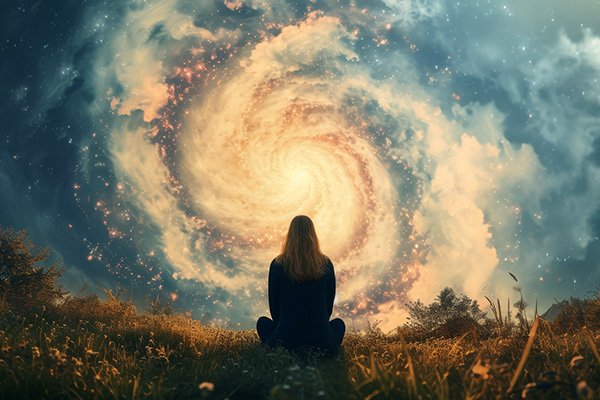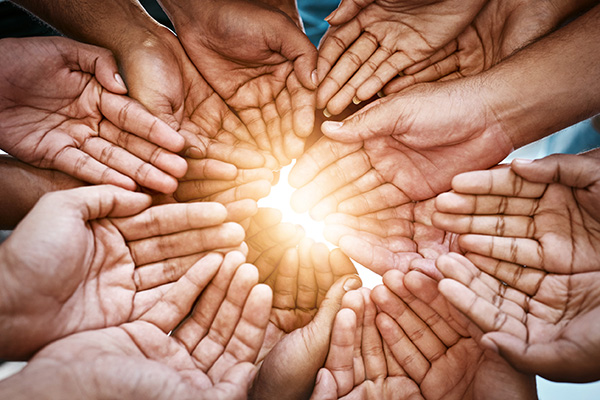god
Rediscovering Prayer As A Personal Practice
 “Prayer” can be a complicated concept for some people, especially when it carries associations with dogma or specific religious traditions.
“Prayer” can be a complicated concept for some people, especially when it carries associations with dogma or specific religious traditions.
On a spiritual path, not everyone relates to a higher power in the same way, and we all experience the sacred or the divine through diverse and deeply personal lenses.
However, no matter how we personally view it, prayer can hold a very meaningful place in any spiritual practice.
As my own spiritual awareness deepened, I came to see God not as a distant figure watching over the world, but as a vast creative presence, an energy that flows through all life. Some connect with this presence as “the universe,” others as their higher self, their guides, or a field of eternal love and light.
I have moved through many of these perspectives myself, and each has offered me unique insights. Over time, returning to the broader concept of God reopened a space of comfort and peace within me, especially through the practice of prayer.
When I was a child, prayer felt natural. It brought reassurance and warmth. Reconnecting with it later in life has brought that same sense of grounding and clarity.
Prayer can be understood as a conversation with God, Source, Spirit, the Divine, with one’s soul, or with the deeper wisdom that resides within and around us. Continue reading
Walking In Faith Through Life’s Ups And Downs
 Most of us go through life like it is a roller coaster ride. We have our ups and downs, our good days and our hard ones. Sometimes we catch ourselves saying things we probably shouldn’t, or reaching for that chocolate chip cookie even though we promised ourselves we wouldn’t.
Most of us go through life like it is a roller coaster ride. We have our ups and downs, our good days and our hard ones. Sometimes we catch ourselves saying things we probably shouldn’t, or reaching for that chocolate chip cookie even though we promised ourselves we wouldn’t.
Temptation is everywhere. That little voice in our head tells us to go for it, even when our gut or intuition says it’s not a good idea. It can leave us feeling torn and unsure of what the right choice really is.
And then, on top of all our personal ups and downs, there’s everything going on in the world around us. Lately, it feels like we’re living through constant upheaval: wars, natural disasters, political division, economic stress, runaway technology, and so much uncertainty about the future. All of it adds to the pressure we already carry.
It’s no wonder we feel overwhelmed or tempted to numb ourselves with distractions. When everything feels unstable, it’s easy to lose our sense of direction or forget the spiritual tools that keep us grounded.
That’s why staying connected to faith, however that looks for you, is more important than ever. It becomes an anchor in the storm, something solid to hold onto when everything else feels like it’s shifting.
Faith helps us pause, speak with care, and make better choices. It gives us insight and direction. When we turn away from it or get stuck in negative thinking, that’s usually when life starts feeling harder and more complicated.
Holding On To What Never Changes
 Nature always inspires deep thoughts in me. There’s something about pausing to watch the wind rustle through the trees or to see the sun gently filter through the clouds that invites stillness and reflection.
Nature always inspires deep thoughts in me. There’s something about pausing to watch the wind rustle through the trees or to see the sun gently filter through the clouds that invites stillness and reflection.
Today, I found myself contemplating the constantly changing seasons. In the Northern Hemisphere, we are a month away from the summer solstice, and the days are becoming increasingly long and warm with golden light. The trees are lush and full, the air hums with the sound of insects, and gardens overflow with life.
Change is everywhere. It’s evident in the ripening of fruit, the intense afternoon heat, and the subtle shift in the season’s energy toward harvest.
It’s not just nature, either. Our lives are constantly evolving, too. Relationships shift, careers transition, health fluctuates, and dreams reshape themselves over time.
No matter where we turn, we hear messages such as “Change is inevitable,” and “Don’t be afraid of change.”
Yes, change is necessary. As spiritual beings, we are meant to continually grow and evolve. Change challenges us, stretches us, and teaches us.
But let’s be honest — sometimes it’s also deeply unsettling. This is especially true in times like these, when the world feels uncertain, divided, and fragile.
What It Really Means To Live A Spiritually Aware Life
 It doesn’t matter who you are or what you do for a living. It doesn’t matter how much money you make, how popular you are, where you live, or how attractive others find you. None of these things define your true worth, and none of them guarantee the fulfillment of your life purpose and soul plan.
It doesn’t matter who you are or what you do for a living. It doesn’t matter how much money you make, how popular you are, where you live, or how attractive others find you. None of these things define your true worth, and none of them guarantee the fulfillment of your life purpose and soul plan.
In the end, your spiritual wealth transcends any bank balance. The only bling that really matters is how much your soul shines from within!
Many of the most beautiful, caring, thoughtful, compassionate, and charitable souls walk quietly among us — unrecognized by the world’s superficial standards of success. They may not be rich. They may not be famous. They may not wear designer clothes or have thousands of social media followers. And yet, they truly shine!
What really matters is how you treat others, how you live your life, and how you embody your higher self and the light of of your soul in everyday moments. That is what counts in the eyes of God, Source, Spirit, the Divine. The essence of your spirit, not your resume or your reflection in a mirror, is what will leave your legacy in this lifetime.
The essence of this truth echoes throughout the world’s spiritual traditions, reminding us that attachment to wealth, superficial pleasures and material status can become hindrances to our spiritual journey and soul growth.
In Hinduism, for example, the Bhagavad Gita teaches that only those who see the divine in all beings and remain unattached to sense pleasures will find lasting peace. Similarly, in Buddhism, the Dhammapada warns that wealth can ruin the foolish, and the desire for wealth becomes an obstacle to enlightenment. The Buddha taught that spiritual liberation requires renunciation of attachment and the cultivation of inner clarity.
Trust Your Gut First, Your Heart Second
 How do you know that what you are doing is for your highest good? How do you know if what you want out of life is based on your own desires, or if it has been placed there to be achieved by the Universe?
How do you know that what you are doing is for your highest good? How do you know if what you want out of life is based on your own desires, or if it has been placed there to be achieved by the Universe?
Everyone has a higher purpose in this lifetime and yet many never seek it out or achieve it because the ego starts to become more prominent in their lives instead of their higher self.
When you were born, a deep-seeded life calling was placed within you. As children, we were able to tap into it, always knowing that we wanted to be a fireman, a policeman, a doctor, an astronaut, an artist, a lawyer, a dancer, a scientist, or a princess. Some of us just wanted to help others, even at a very young age. We would be kind, caring, and giving to other people, whether they were children, adults, or seniors.
Unfortunately, this energy has been buried over time by the society and culture we live in – whether it be teachers, parents or mentors.
Has anyone ever laughed at you when you told them what you wanted to do or be? Did someone say, “Go back and think about that, because that will never happen”? Each of us has a different story as to why we do or do not achieve our passion and purpose in life.
Today is the day to decide, “I will achieve my dreams as long as they come from spirit and are for my highest good.

